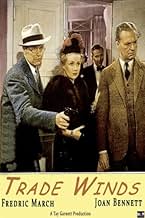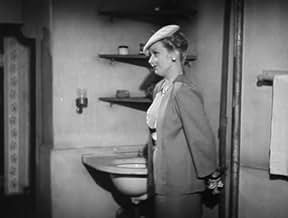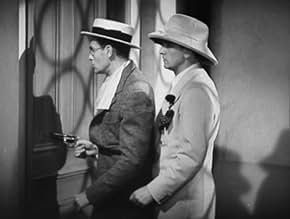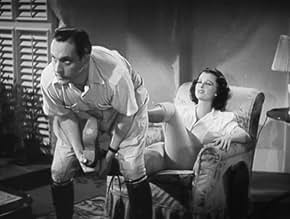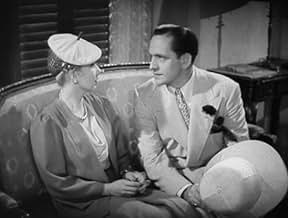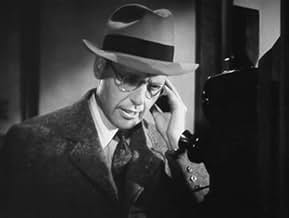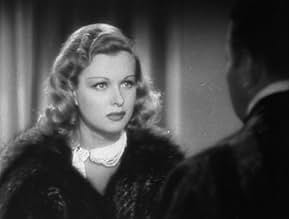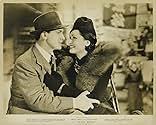अपनी भाषा में प्लॉट जोड़ेंKay Kerrigan commits a murder and then changes her hair color, assumes a new identity and flees the country by ship. She's unaware that she's being followed by Sam Wye, a skirt chasing detec... सभी पढ़ेंKay Kerrigan commits a murder and then changes her hair color, assumes a new identity and flees the country by ship. She's unaware that she's being followed by Sam Wye, a skirt chasing detective. The two soon develop a shipboard romance.Kay Kerrigan commits a murder and then changes her hair color, assumes a new identity and flees the country by ship. She's unaware that she's being followed by Sam Wye, a skirt chasing detective. The two soon develop a shipboard romance.
- पुरस्कार
- कुल 3 जीत
- Ann
- (as Linda Winters)
- Hawaiian Girl
- (बिना क्रेडिट के)
- Detective
- (बिना क्रेडिट के)
- Police Announcer
- (वॉइस)
- (बिना क्रेडिट के)
- Pianist
- (बिना क्रेडिट के)
- Ruth
- (बिना क्रेडिट के)
- Detective
- (बिना क्रेडिट के)
- Roger - Party Guest
- (बिना क्रेडिट के)
फ़ीचर्ड समीक्षाएं
Not quite a sophisticated comedy, not quite a picaresque chase, not quite a murder mystery- - all add up to a not very good movie. Hard to believe this is from glossy MGM since the production values are nearly incompetent. In fact, I've seen better process shots from a Lash LaRue oater, and since these make up half the movie, you've got to wonder where quality control was.
I'm assuming acerbic wit Dorothy Parker and husband Alan Campbell were hired to furnish sophisticated banter for the two couples. If so, I must have missed it. What I did hear were subtle grammar gaffes from Sothern (e.g. 'whom for 'who') and clever malaprops (e.g. 'deduct' for 'deduce') from Bellamy, intended, I guess, to show their humorous pretensions, but hardly crowd-pleasers.
Also, it looks like Bellamy's buffoonish cop amounts to a typical example of 30's cops when Hollywood treated them as low-comedy relief. And whose idea was it to tack on the last 10-minutes of whodunit that sort of sticks out like a glued on appendage.
Where the movie does work is with the lovely Bennett and the comedically gifted Sothern. Still, it's a bit puzzling why the movie didn't turn out better given the talent involved, including ace producer Walter Wanger. Maybe it has to do with as many as four writers and who knows how many re-writes or with director Garnett's inability to forge a unifying style. But, whatever the reason, the film remains a somewhat unlikely disappointment.
March falls in love with her and faces the dilemma of turning her in to the authorities, while Bellamy finds romance with wise-cracking secretary ANN SOTHERN. That's about it, for the plot. The suspense lies in learning when and how the Bennett/March romance will flounder and come to some sort of resolution for the final reel.
Director Tay Garnett makes heavy use of his home movies for all of the process shots used extensively throughout filming. The effects cheapen the images on screen so that never for a moment do you feel that these events are taking place in actual locales, only in front of a process screen full of faded images.
Silliness of the comedy interludes are imposed on any dramatic elements the story has, making for an uneven mixture of comedy and drama.
Joan Bennett's transformation to a stunning brunette changed the course of her career as she goes from blonde to brunette to avoid capture. It's the only interesting aspect of the photoplay for this viewer.
Performances are competent with Sothern and Bellamy vying for attention in some amusing byplay that at least gives some indication of Dorothy Parker's contribution. But generally speaking, the comic moments are strained and appear more foolish than witty. Revelation of the events surrounding Bennett's murder charge strikes a false note for the ending.
The usually reliable Ralph Bellamy, who excelled as the proverbial light comic "other man" in classics like "His Girl Friday," "The Awful Truth," and "Brother Orchid," ends up as an oafish buffoon of a policeman of the type often played by Edgar or Tom Kennedy. His performance clashes with March's and at times he seems out of an alternative universe. Although Ann Sothern has a very enjoyable drunk scene, she's underutilized, and the usually reliable Thomas Mitchell is given little to do but growl as a police commissioner... wasted in a role than would have usually gone to a William Frawley.
The film's inconsistencies are likely the fault of writer/director Tay Garnett, who had a lengthy but inconsistent career resume' with at least one masterpiece ("The Postman Always Rings Twice") to his credit. He did helm some films with similar elements to "Trade Winds": "One Way Passage" with Powell and Francis, "Seven Sinners" with Dietrich and Wayne, and "China Seas" with Gable and Harlow, but unfortunately Garnett never developed a consistent style, and by the 1950s he was directing TV Western series episodes like "Death Valley Days" and "Bonanza". With a steadier hand like a Howard Hawks at the helm, and more appropriate cast choices "Trade Winds" may have been a minor classic, but now it's just a curiosity. By the way, two interesting sidebars: Dorothy Parker (of Algonquin Round Table fame) was a collaborator on the script and the enigmatic Dorothy Comingore appears briefly here (under the name Linda Winters) several years before her triumph in "Citizen Kane."
Bennett plays Kay Kerrigan, a young woman who is out to avenge her sister's death and goes after her sister's ex-boyfriend (Sidney Blackmer). When Kay says she wishes she could shoot him, he hands her a gun and she shoots. Then she starts running for her life. To change her appearance, she dyes her hair dark. This turned out to be a boon for Bennett, who took on an exciting new look with the dark hair.
The police send one of their own after her, Ben Blodgett (Ralph Bellamy) and one of their ex-own, the womanizing, slippery Sam Wye (March), now a detective who spends a lot of time coming on to women. He's also romancing his secretary Jean (Ann Sothern). He agrees to search for Kay and manages to get away from from Jean and hop a boat. He gets a line on Kay, and when Jean next appears, she's an assistant to Kay. Then Sam finds out there's a $100,000 award on Kay's head. Small problem - he falls madly in love with Kay.
Fun comedy that slows up in the middle, with good performances by a relaxed March, a very funny Sothern, a lovely Bennett, and Bellamy as an overblown police detective. Not the best, but not bad - except for some of the process shots.
क्या आपको पता है
- ट्रिवियाAnn Sothern's character proved so popular in this movie, it was spun off to create series of "Maisie" films.
- गूफ़When Thomas is shot, he is wearing a striped robe with a bright monogram on the left breast. When we later see his body on the floor, with the police investigating, the monogram is missing.
- भाव
Commissioner Blackton: There's not one of you - not one - that could trail a puppy with muddy feet across a white bedspread.
- कनेक्शनReferenced in The Rookie Cop (1939)
- साउंडट्रैकWhen Irish Eyes Are Smiling
(uncredited)
Lyrics by Chauncey Olcott and George Graff (as George Graf, Jr.)
Music by Ernest Ball
Played by Fredric March on piano
टॉप पसंद
- How long is Trade Winds?Alexa द्वारा संचालित
विवरण
- रिलीज़ की तारीख़
- कंट्री ऑफ़ ओरिजिन
- भाषा
- इस रूप में भी जाना जाता है
- La fugitiva de los trópicos
- उत्पादन कंपनी
- IMDbPro पर और कंपनी क्रेडिट देखें
बॉक्स ऑफ़िस
- बजट
- $7,38,733(अनुमानित)
- चलने की अवधि1 घंटा 33 मिनट
- रंग
- पक्ष अनुपात
- 1.37 : 1
इस पेज में योगदान दें


